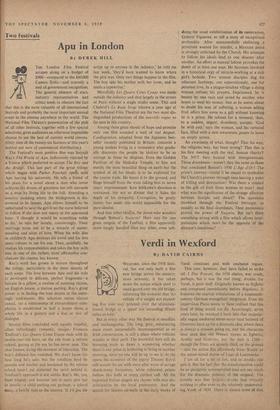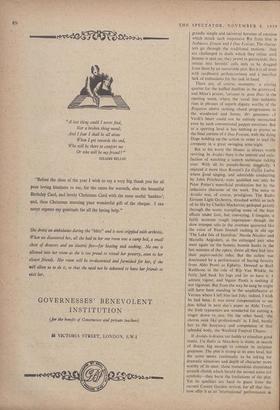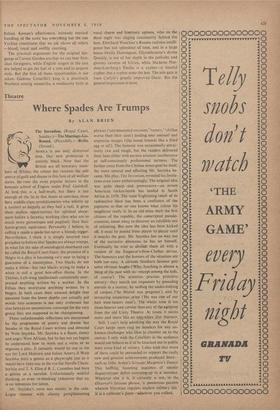Verdi in Wexford
By DAVID CAIRNS
WEXFORD, since the 1958 festi- val, has not only built a fine new bridge across the estuary; more seriously, it has taken down the notice which used to
stand guard over the old bridge, informing' the motorist that 'no
vehicle of a weight not exceed ing five tons may .prOceed over the aforeMen.- tioned bridge at a speed not exceeding fifteen miles an hour.'
But in every other way the festival is steadfast and unchangeable. The long, grey, meandering main street, purposefully inconsequential as an Irish conversation, is still a place where vehicles wander at their peril. The bountiful bars still do booming trade as dawn is wondering whether there is any point in bothering to bring in another morning, since no one will be up to see it, At the opera the acoustics of the pigmy Theatre Royal still assault the ear with wave after wave of savage shock-troop fortissimo, while rubicund priests bellow like bulls at every curtain call. All the imported Italian singers are chosen with nice dis- crimination by the local postmaster. And the search for hidden oil-wells in the early works of Verdi continues and with unabated vigour.
This year, however, they have failed to strike oil. I Due Foscari, the 1958 choice, was crude, perhaps, but it was the real thing; Aroldo, for Verdi, is poor stuff. Originally known as Sliffelio and composed immediately before Rigoleuo, it featured the marital tribulations of a nineteenth- century German evangelical. clergyman. Even the impervious Piave seems to have realised that this kind of thing would not do. Accordingly, seven years later, he tweaked it back into that majestic- ally :vague mediaeval 'never-never-land beloved of librettists hard up for a dramatic idea, where there is always a crusade going on, and the characters bear such fine old Wessex names as Egberto, Aroldo and Godvino, but the date is 1200— though the friars are already thick on the ground --and the action flits effortlessly from 'Kenth' to the sunset-tinted shores of Lago di Loomondo.
am all for a bit of fun, and in Aroldo one gets it. But the fact that the transformation could be so painlessly accomplished does not say much for the dramatic potency of the original. The trouble was that StiffeliolAroldo had virtually nothing to offer even to the relatively undemand- ing Verdi of 1850. There is almost none of that grandly simple and universal heroism of emotion which struck such responsive fire from him in Nabucco, Ernani and I Due Foscari. The charac- ters go through the traditional motions: they are challenged to duels which they refuse until honour is spat on; they prowl in graveyards; they retreat into hermits' cells only to be dragged from them by an inexorable plot. But it is all done with cardboard perfunctoriness and a manifest lack of enthusiasm for the task in hand.
Them are, of course, moments: a stirring quartet for the baffled duellists in the graveyard, and Mina's prayer, 'saivami to gran Dio.' in the opening scene, where the vocal line suddenly rises in phrases of superb dignity worthy of the Requiem above striking chord progressions in the woodwind and horns; tIh° greatness t,f Verdi's heart could not be entirely untouched even by such conventional puppet emotions. But at a sporting level it has nothing as joyous as the final curtain of I Due Foscari, with the dying Doge holding up the action in order to lead the company in a great swinging nine/eight.
But at his worst the Master is always worth reviving. In Aroldo there is the interest and satis- faction of watching a superb technique ticking over. With all its pseudo-heroic simplicity, 1 enjoyed it more than Rossini's La Gazia Ladra, where good singing, and admirable conducting by John Pritchard, were qualified not only by Peter Potter's superficial production but by the indecisive character of the work. The noise in Aroldo was, of course, prodigious. The Radio Eireann Light Orchestra, thrashed within an inch of its life by Charles Mackerras, galloped gamely through the score, trampling some of the finer effects under foot, but conveying, I imagine, a fairly accurate rough impression—though the slow trumpet solo in the overture quavered like the voice of Yeats himself reciting in old age 'The Lake Isle of Innisfree.' Nicola Nicolov and Mariella Angioletti, as the estranged pair who meet again on' the bonnie, bonnie banks in the last minutes of the opera, threw all they had into their papier-mache roles. But the action was dominated by a performance of baying ferocity from Aldo Protti as Egberto. Dressed as Basil Rathbone in the role of Rip Van Winkle, he fairly laid back his lugs and let us have it. I admire vigour, and Signor Protti is nothing if not vigorous. But from the way he sang he might still have been_ standing in the amphitheatre at Verona where I left him last July; indeed, I wish he had been. It was some compensation to see him billed in next day's paper as Aldo Trotti; the Irish typesetters are wonderful for cutting a singer down to size. On the other hand, the chorus sank like' professionals' is, I feel, hardly fair to the buoyancy and competence of that splendid body, the Wexford Festival Chorus.
If Aroldo is drama too feeble to stimulate good music, Un Ballo in Maschera is music in search of drama big enough to contain its incipient greatness. The plot is strong at its own level, but the score seems continually to be asking for dramatic situations and depth of character more worthy of its steel; those tremendous diminished seventh chords which herald the second scene are symbolic—they burst the limitations of the plot. Yet its qualities are hard to guess from the current Covent Garden revival, for'all that they now offer it as an 'international' performance, in
Italian. Kempe's affectionate, intensely musical handling of the score has everything but the one Verdian constituent that we ask above all others —blood. royal and swiftly coursing.
The practical arguments for the original lan- guage at Covent Garden are that we can hear first- class foreigners, while English singers in the cast are helped to get the feel of a role and to acquire style. But the first of these opportunities is not taken. Gastone Limarilli's king is a pinchbeck Warbeck among monarchs, a mediocrity both in vocal charm and histrionic aptness, who on the third night was singing consistently behind the beat. Eberhard Waechter's Renato radiates intelli- gence but not splendour of tone, and in a large house Oralia Dominguez, Glyndebourne's divine Quickly, is out of her depth in the potholes and gloomy caverns of Ulrica, while Madame Nor- dmo-Loevberg's Emilia is a cypher--a tuneful cypher, but a cypher none the less. The sole gain is Joan Carlyle's greatly improved Oscar. But the general impression is tame.








































 Previous page
Previous page